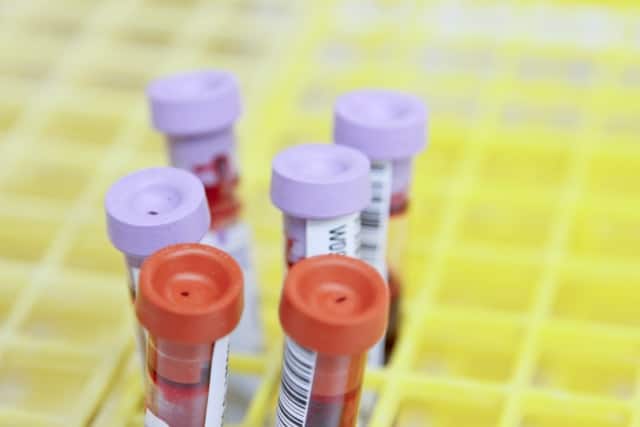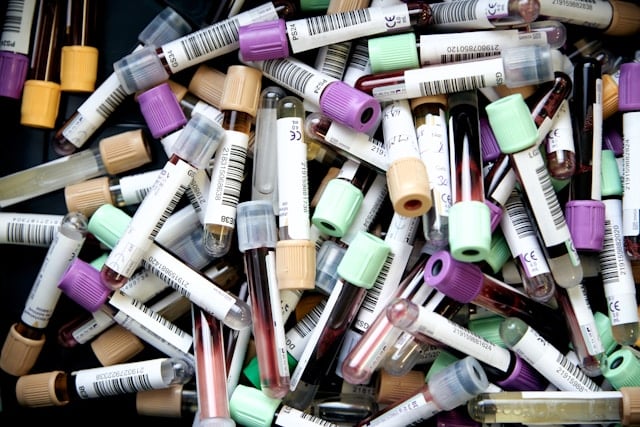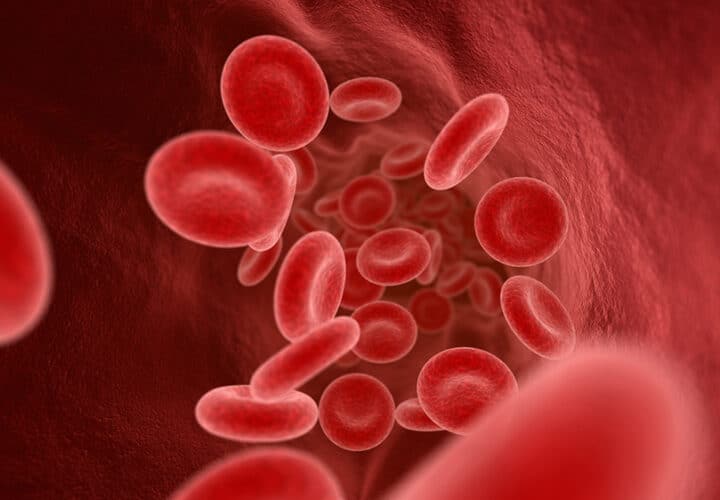Three blood tests take center stage at AAIC as researchers showed the advantages of integrating them into standard practice for diagnosing Alzheimer's.
According to new diagnostic criteria for Alzheimer’s, a blood test might be all you need to get diagnosed in the near future. At this year’s Alzheimer’s Association International Conference in Philadelphia, researchers presented three studies showing how blood tests could not only streamline diagnosis but help enroll asymptomatic participants get into clinical trials faster.
Study 1: Blood test beat out doctors’ intuition in diagnosing Alzheimer’s
Researchers in Sweden tested the efficacy of blood tests in diagnosing Alzheimer’s disease. They pitted the blood tests — which test for Alzheimer’s biomarkers in the blood — against doctors and neurologists who were diagnosing the disease based on clinical visits, but who didn’t have any access to biomarker information. The research was presented at AAIC by Dr. Sebastian Palmqvist, a professor at Lund University in Sweden, and simultaneously published in JAMA.
Typically, clinicians will diagnose Alzheimer’s through a battery of cognitive tests, a medical history, and blood tests to rule out other conditions. Now, with treatments like Leqembi and Kisunla available, doctors are also running tests to confirm the presence of amyloid in the brain and see if patients might be eligible. But there are often long wait times for lumbar punctures and PET scans, so researchers are studying how blood tests could help doctors make the right clinical decision faster.
In Palmqvist’s study, which measured the levels of specific proteins in the blood to determine whether someone has beta-amyloid in the brain, researchers recruited 1,213 participants who received C2N Diagnostics’ PrecivityAD2 blood test. The test looked at the ratio of p-tau217 to np-tau217 proteins and Aβ42 to Aβ40 proteins to make the prediction, after which they used cerebrospinal fluid tests and amyloid PET scans to double-check the accuracy of the blood tests.
In the study, doctors assessed 515 patients and were 63 percent accurate in diagnosing Alzheimer’s, while the blood test was 90 percent accurate. In the 698 patients who went to a specialized memory clinic, the clinicians were 73 percent accurate while the blood test was 90 percent accurate.
Under updated diagnostic criteria, neurologists could make the diagnosis from blood tests alone as this particular blood test meets the accuracy recommendations outlined in the diagnostic criteria, however the study’s authors emphasize that, at least for now, a person should not be diagnosed based on the blood test alone.
“It is crucial to emphasize that a biomarker for Alzheimer disease pathology, however accurate, should not serve as a standalone diagnostic test for Alzheimer disease but must be interpreted in a clinical context,” Palmqvist told Being Patient.
C2N Diagnostics’ PrecivityAD2 blood test is one of 10 different blood tests already on the market. Despite being fairly new, these tests for Alzheimer’s aren’t without controversy. Blood tests are an emerging market in Alzheimer’s diagnosis. The tests vary in what they’re looking for and in their levels of accuracy. And consumers don’t always know how accurate a test is, as some of the test makers haven’t published their efficacy data.
Further: Until very recently, the developers of these blood tests did not need to apply for approval from the Food and Drug Administration nor prove the accuracy of their test. As of July 2024, any tests developed in the future will need to go through the FDA though existing tests will remain exempt from this requirement.
Study 2: Blood tests could speed up trial recruitment
Many drug companies struggle to recruit participants for trials of drugs that could prevent or delay Alzheimer’s because it takes time to screen healthy participants for amyloid plaques with PET scans and lumbar punctures before symptoms set in.
One study that aimed to see whether an anti-amyloid drug could prevent healthy people with amyloid in their brain from preventing symptoms took four years to recruit enough participants.
Could blood tests speed up the process?
At AAIC, researchers presented a study that tested whether blood biomarkers could be used as a pre-screening tool. It looked at biomarker data from 2,718 cognitively healthy enrolled participants across 10 studies to determine if the biomarkers measured in the blood matched up with their amyloid PET scan and cerebrospinal fluid test. The blood biomarker called p-tau217 could predict whether someone had amyloid plaques in their brain 79 to 86 percent of the time.
“If these numbers hold up and are replicated and confirmed by other independent labs, this approach may reduce the need for lumbar punctures and PET scans for Alzheimer’s diagnosis by 80 or even 90 percent,” lead author Gemma Salvadó, an associate researcher at Lund University, said in a press release. The authors said it also shows that the blood test could be used in lieu of PET scans or lumbar punctures for clinical trials.
Study 3: Blood tests could reduce wait time for diagnosis and treatment
Dr. Soeren Mattke, a neurologist and director of the Brain Health Observatory at the University of South California, Los Angeles, presented a study that modeled wait times for an Alzheimer’s diagnosis with and without a blood test in the U.S.
Mattke’s study was funded by C2N Diagnostics, which has two Alzheimer’s blood tests on the market.
Right now, someone over 65 who goes to their doctor with memory problems may need to wait 36 months to get a diagnosis because there aren’t many neurologists, and there is a wait time for amyloid PET scans and lumbar puncture. As the U.S. population continues to age, the number of people who will develop Alzheimer’s is set to increase. That means by 2033, it might take six years to receive a diagnosis.
Adding blood tests into the equation could speed up the diagnostic process. Tests that could rule out Alzheimer’s for example, would reduce wait times to 13 months. More accurate tests that could potentially replace PET scans or cerebrospinal fluid tests by confirming the presence of Alzheimer’s biomarkers in the brain could reduce wait times to six months.
But blood tests aren’t ready for game time just yet. Even if a blood test is accurate 90 percent of the time, testing more people would introduce a lot of false positives. “If you can test large numbers without capacity constraints, then you can really kind of say, well, [widespread blood testing] doesn’t make sense,” said Mattke.
Mattke thinks that more standardization and expert guidelines are needed to help mitigate these challenges and make doctors more confident using them. “Blood tests haven’t been around for that long, and none of them is FDA approved,” Mattke told Being Patient. “There are lots of questionable tests out there, especially if they’re marketed to the public.”
In 2023, Quest Diagnostics released an Alzheimer’s blood test to the public, allowing anyone over the age of 18 with self-reported memory problems or a family history of dementia to take the test, even though scientists have no idea whether these biomarkers provide any useful information for younger, healthy people. Neurologists called the blood test “an absolute catastrophe” because of its poor accuracy, misleading marketing, and the potential harm it could cause patients. Eventually, the backlash led to Quest requiring doctors to order the test.
With a progressive disease, even six months can be a long time to wait — by the time a patient receives a diagnosis, they may have progressed past the window where they can be prescribed an Alzheimer’s treatment. So why does it take so long to get a diagnosis?
“Alzheimer’s disease is not a big specialty in medicine because there was never a treatment,” Mattke said. With emerging treatments, countries like the U.S. are playing catch up to ensure that people can get diagnosed in time to access them.




